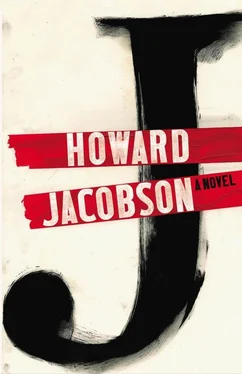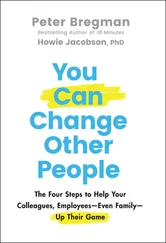Kevern didn’t understand. Hadn’t his grandfather, of whom he knew next to nothing, suffered his breakdown after the disappearance of his wife, Kevern’s grandmother Jenna, of whom Kevern also knew next to nothing except that one elusive fact — that she’d gone out of the cottage and never returned? Who wouldn’t suffer a breakdown after that? In which case there was no genetic disposition to this illness in the family, unless there was a genetic disposition on the part of the womenfolk to disappear.
‘A witty distinction,’ his father acknowledged, ‘but that’s your mother’s father you’re thinking of, so there’s nothing genetically I could have inherited from him anyway.’
‘What propensity then do you think you inherited from your own?’ Kevern asked.
‘The propensity to terror, but not, I am ashamed to say, the propensity to courage in the face of it. Nor, come to that, though this is not something I would wish you to have known about me before — but now it doesn’t matter, now nothing matters — the propensity to loyalty.’
Kevern asked him what he meant, but he would say no more.
A disloyal coward, then. Well Kevern could enter sympathetically into that. How much loyalty would he show, if ever put to the test? How much resolution in the face of fear, pain, suspicion? When he locked and double-locked his door, wasn’t he double-locking himself against faint-heartedness? But it hardly helped to know this. Whatever evidence Gutkind had been hunting for, it surely wasn’t evidence of Kevern’s inherited feebleness of character.
Then he remembered that just before he died his father grabbed his sleeve and, knocking over the candle that provided the only light he could bear, begged distractedly for his dog.
‘You have no dog,’ Kevern said.
‘You don’t have to lie to me,’ his father said.
Kevern wondered if that meant his father wanted him to lie to him. But he couldn’t produce a dog. He could tell him his dog had died, but where would be the kindness in that? ‘You have had no dog for a long time,’ he decided to say instead.
His father nodded, seeming to remember. ‘Mr Bo  angles’ — he summoned the strength to cross the
angles’ — he summoned the strength to cross the  , as though for the final time — ‘grieved for his dog for twenty years. I’ve grieved longer.’
, as though for the final time — ‘grieved for his dog for twenty years. I’ve grieved longer.’
Kevern took the hand he hadn’t loved. ‘Well, he was a fine dog,’ he said.
‘Not for the dog, you fool!’
Kevern didn’t ask ‘Then for whom?’ It was possible he didn’t want to know.
‘Forgive me,’ his father said after a pause that Kevern thought would be his last.
‘I have nothing to forgive you for,’ Kevern said. ‘You have cared for me.’
‘Not you.’
‘You have, you cared for me. You and Mam.’
The old man took his hand from Kevern’s grasp and waved it across his face, as though to shoo away flies. ‘Not you forgive me. He forgive me.’
‘The dog?’
‘What dog? Why do you keep going on about a dog when I’m talking about my brother?’
This was the first time Kevern had heard mention of a brother. Presumably he too, like the dog, was the invention of delirium.
‘I’m sure he had nothing to forgive you for, either.’
‘What do you know!’ Another assault on the invisible flies, then something like a laugh from far away. ‘Ha! It’ll have to be you, then. You’re the only one left, so it’ll have to be you. Like the song. “It had to be you”. . You forgive me. You do it for him.’
‘Can I do that?’
‘There’s no one else.’
‘Then I forgive you,’ Kevern said.
They were so secretive a family it didn’t occur to him to ask what his father needed to be forgiven for. He didn’t think it was any of his business. More to the point, he didn’t want it to be any of his business. The aesthete in him shrank from such melodrama. He made small, finely crafted objects. A candlestick was the biggest thing to come off his lathe. And even his candlesticks had narrow waists and attenuated necks. If he hung his clothes in a Biedermeier wardrobe it was only in deference to his father’s bulking sense of private tragedy. Biedermeier was where he came from, that was all. But where he came from kept rearing up at him, never to be satisfied until it had ripped open his throat. More melodrama. See, he  eered at himself, you are no better than your father. You can go on making all the intricately entangled lovespoons you like, your own entanglements remain gross. Ailinn? No, of course not Ailinn. But hadn’t his treatment of her been gross? Shutting her out of his life like a dog?
eered at himself, you are no better than your father. You can go on making all the intricately entangled lovespoons you like, your own entanglements remain gross. Ailinn? No, of course not Ailinn. But hadn’t his treatment of her been gross? Shutting her out of his life like a dog?
He hadn’t asked his father, ever, about anything because he hadn’t ever wanted to hear the answer. But you don’t always have to ask to know. And Kevern knew the answer in the way he knew so many things. He knew it and he didn’t know it.
His father, then no more than a boy, he couldn’t have been, closing the door on a brother, refusing to assist him, refusing his cries for help, leaving him out in the cold like a dog, letting whoever was after him have him, never mind who or why, he knew who and why — this, from innumerable clues, from an accumulation of half-expressed regrets and barely smothered confessions, from a history of hysterical injunctions and prohibitions, from asides and songs and sorrows, from skeletal dances and stillborn  ests, from what he knew generally of the human heart and what he knew specifically of his father’s shrivelled soul, from logical deduction and common sense and experience, from the frightened life they’d lived in their fortress cottage ever since he could remember, and from what he suspected too well he would do if ever put to the same test — all this Kevern saw and didn’t see.
ests, from what he knew generally of the human heart and what he knew specifically of his father’s shrivelled soul, from logical deduction and common sense and experience, from the frightened life they’d lived in their fortress cottage ever since he could remember, and from what he suspected too well he would do if ever put to the same test — all this Kevern saw and didn’t see.
iii
He was out early the morning after these recollections, sitting on his bench chewing over his father’s plea, feeling the spittle from the blowhole on his face — submitting to nature’s insults — when Densdell Kroplik found him. Kevern had heard the footsteps and hoped they were Ailinn’s. Ailinn, with one of her paper flowers in her hair and another in her hand, come to receive his apology and plant a kiss on his brow. Ailinn, the light of his life.
He needed to be embraced. But not by Densdell Kroplik.
‘A penny for them,’ Kroplik said, employing his civil voice.
He was a strange sight up here against the sky, as though Caspar David Friedrich’s Wanderer Above the Mists had suddenly turned around and shown himself. He was not wearing a frockcoat, though, but a smart, tweed, countryman’s suit, with a raincoat over his arm. A miracle that anyone so businesslike could emerge from Kroplik’s cowshed. It was this that made Kevern wonder if he were seeing things.
A raincoat and no rucksack, as though he’d come down out of the morning mist to meet his solicitor. Even the angry ruddiness of his cheeks was damped down, Kevern noted. Did that mean he could turn it on and off at will — his raging rusticity?
‘So what business are you on, looking such a dandy?’ Kevern asked.
Kroplik tapped his nose.
It was that gesture, more than anything else — denoting a man who had a hundred secrets of his own and was privy to a thousand more — that inveigled Kevern, who had hardly slept, into confidentiality. Who could say: maybe Kroplik knew something about what was going on.
‘I’ve been away for a few days,’ Kevern confided.
Читать дальше

 angles’ — he summoned the strength to cross the
angles’ — he summoned the strength to cross the 










